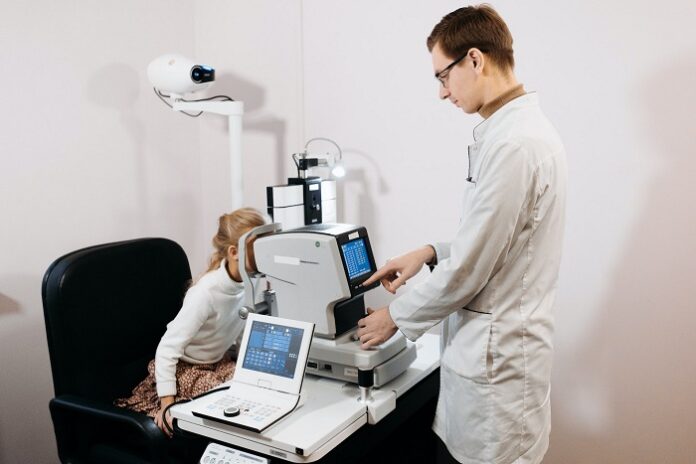When it comes to eye health, visiting an optician is an essential step in maintaining good vision. Opticians are healthcare professionals who specialize in examining eyes, diagnosing vision problems, and prescribing corrective lenses. They play a crucial role in helping people maintain good eye health and preventing vision loss.
During a visit to an optician’s clinic, patients can expect to undergo a comprehensive eye examination. This examination typically includes a variety of tests to assess visual acuity, eye muscle function, peripheral vision, and eye health. The optician may also ask questions about the patient’s medical history, lifestyle, and any vision problems they may be experiencing. Based on the results of these tests, the optician will then recommend a course of action, which may include prescribing glasses or contact lenses, referring the patient to an ophthalmologist for further treatment, or providing advice on how to maintain good eye health.
Overall, visiting an optician is an important step in maintaining good eye health. Opticians are highly skilled healthcare professionals who can help diagnose and treat a wide range of vision problems. By undergoing regular eye examinations and following the advice of their optician, patients can help ensure that their eyes remain healthy and their vision remains clear.
Understanding the Role of Opticians
Opticians are qualified healthcare professionals who specialize in eye health. They are trained to provide a range of services related to eye care, including eye examinations, measuring visual acuity, prescribing optical prescriptions, and fitting glasses and contact lenses.
At an optician’s clinic, the optician will typically start by examining the patient’s eyes to determine their visual acuity and identify any abnormalities or conditions, such as cataracts or glaucoma. They will then measure the patient’s eyes to determine the appropriate optical prescription for glasses or contact lenses.
Opticians are also trained to provide advice on maintaining good eye health and can answer questions related to all things eye and vision related. They can provide information on how to prevent eye diseases and injuries and can recommend appropriate eye care products.
Dispensing opticians are a type of optician who specialize in fitting glasses and contact lenses. They work closely with patients to ensure that their glasses or contact lenses fit properly and provide the necessary correction for their visual needs.
In summary, opticians are highly trained healthcare professionals who play a critical role in maintaining the eye health of patients. They are qualified to provide a range of services related to eye care, including eye examinations, measuring visual acuity, prescribing optical prescriptions, and fitting glasses and contact lenses. They are also knowledgeable about maintaining good eye health and can provide advice on preventing eye diseases and injuries.
Services Provided by Opticians
Opticians provide a range of services related to eye care. These services include eye tests and examinations, prescription glasses and contact lenses, and treatment and management of eye conditions.
Eye Tests and Examinations
Eye tests and examinations are the primary services provided by opticians. During an eye test, an optometrist will examine the eyes to assess their health and detect any eye problems. This examination includes a vision test, which involves reading an eye chart to determine how well a person can see at different distances.
Prescription Glasses and Contact Lenses
If a person needs corrective lenses, an optician can provide prescription glasses or contact lenses. Prescription glasses come in a variety of frames and lens types, including single vision, bifocal, and varifocal lenses. Opticians can also provide prescription sunglasses and offer advice on lens coatings, such as anti-reflective coatings.
Contact lenses are available in different types, including disposable daily contact lenses, extended wear contact lenses, varifocal contact lenses, soft contact lenses, and gas permeable lenses. Opticians can help people choose the best type of contact lens for their needs and provide advice on proper care and use.
Treatment and Management of Eye Conditions
Opticians can also provide treatment and management for a range of eye conditions. They can offer advice on treatment options for myopia, hyperopia, and presbyopia, as well as for eye diseases such as retinopathy, dry AMD, wet AMD, and glaucoma. Opticians can also monitor the progression of eye conditions and refer patients to other healthcare professionals if necessary.
In the UK, everyone is entitled to a free NHS sight test every two years, or more frequently if recommended by an optometrist. Opticians can provide mobile sight tests for people who are unable to leave their homes.
Overall, opticians play a crucial role in maintaining eye health and providing corrective lenses and treatment for eye conditions.
Common Eye Conditions and Their Treatment
When visiting an optician, it’s important to be aware of some of the most common eye conditions and their treatments. Here are some of the most prevalent conditions:
Cataracts
Cataracts are a clouding of the eye’s natural lens, which can cause blurred vision and difficulty seeing in low light. They are most commonly caused by ageing but can also be caused by injury, certain medications or medical conditions such as diabetes. Cataract removal surgery is a common treatment for cataracts, which involves removing the cloudy lens and replacing it with an artificial one.
Glaucoma
Glaucoma is an eye disease that damages the optic nerve, leading to vision loss and blindness if left untreated. It is often caused by high pressure inside the eye and is more common in people over the age of 60, those with a family history of the disease, and those with certain medical conditions such as diabetes or high blood pressure. Treatment for glaucoma can include eye drops, laser treatment or surgery.
Age-related Macular Degeneration (AMD)
AMD is a condition that affects the macula, the part of the eye responsible for central vision. It is most commonly caused by ageing and can lead to blurred or distorted vision. There are two types of AMD: dry and wet. Dry AMD is more common and has no specific treatment, but regular monitoring is important. Wet AMD can be treated with injections into the eye.
Dry Eyes
Dry eyes occur when the eyes don’t produce enough tears or when the tears evaporate too quickly. This can cause discomfort, irritation and even blurred vision. Treatment for dry eyes can include artificial tears, prescription eye drops, or even surgery in severe cases.
Conjunctivitis
Conjunctivitis, also known as pink eye, is an inflammation of the conjunctiva, the thin layer of tissue that covers the white part of the eye. It can be caused by allergies, bacteria or viruses, and can lead to redness, itching, and discharge from the eye. Treatment for conjunctivitis can include eye drops, warm compresses, or antibiotics if it is caused by a bacterial infection.
Diabetic Retinopathy
Diabetic retinopathy is a complication of diabetes that affects the blood vessels in the retina, causing them to leak or become blocked. This can lead to vision loss or blindness if left untreated. Treatment for diabetic retinopathy can include laser treatment or surgery.
Smoking
Smoking is a risk factor for many eye diseases, including cataracts, AMD, and glaucoma. Quitting smoking can reduce the risk of developing these conditions and can also slow their progression if they have already developed.
Bifocal Lenses
Bifocal lenses are a type of eyeglass lens that have two different prescriptions in one lens, allowing for clear vision at both near and far distances. They are commonly used to treat presbyopia, a condition that affects the ability to focus on near objects that often develops with age.
Overall, it’s important to have regular sight tests to diagnose and treat any eye conditions early. Opticians can provide advice on the best treatment options for each individual’s needs.
Understanding NHS Support and Eligibility
When it comes to visiting an optician, the NHS provides support and eligibility for certain individuals. For instance, free NHS eye tests are available to those who are eligible. The NHS recommends that individuals have their eyes tested every two years, or more frequently if advised by their optometrist or ophthalmic practitioner.
To be eligible for a free NHS eye test, individuals need to be in one of the eligible groups and the test must be considered clinically necessary. Anyone over the age of 60 and under the age of 16 is eligible for a free NHS eye test. Additionally, those under the age of 19 and in full-time education, those with diabetes or glaucoma, and those aged 40 or over with a close relative with glaucoma are also eligible.
In addition to free NHS eye tests, individuals may also be entitled to optical vouchers. These vouchers can be used to help pay for glasses or contact lenses. The value of the voucher depends on the type of lenses required and is determined by the optician.
To determine eligibility for free NHS eye tests, individuals can use the online eligibility checker available on the NHS website. Additionally, individuals may be eligible for help with other health costs through the NHS Low Income Scheme. This scheme provides support for those who are on a low income and may be eligible for an HC2 or HC3 certificate.
Those who receive Income Support or Income-Based Jobseeker’s Allowance may also be eligible for free NHS eye tests and optical vouchers. It is important to note that individuals must bring proof of their entitlement to their appointment, such as a valid NHS exemption certificate or proof of benefits.
Overall, understanding NHS support and eligibility can help individuals receive the necessary eye care they need without incurring additional costs.
The article was written in cooperation with the experts of Glasson – Optician & Optometry Management Software





